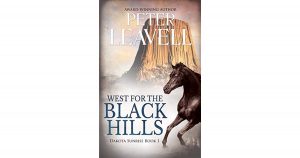by Peter Leavell, @PeterLeavell

I’ve studied Looney Tunes for four decades.
Bugs Bunny, Daffy Duck, Porky Pig, Sylvester, Tweety, Wile E. Coyote, Marvin the Martian, and so many more characters, for better or worse, live in our hearts and minds.
Looney Tunes offer no character development, story arc, or strong moral takeaway. We simply have a character who wants something and can’t get what they want. The players usually resort to violence or some other nefarious means to clear a path to assuage their hunger, find peace, or simply survive. If compared to a movie, Looney Tunes could be Rambo or Hunger Games, yet those two movies enjoy more redemptive qualities.
So, why do I still watch Looney Tunes? Or better asked, are there any edifying qualities to watching Bugs Bunny destroy Elmer Fudd? What can we learn from Looney Tunes to better our fiction?
Hemingway pointed out that some characters are Code Heroes. From the beginning of the story, we have all we need to know about them. They are not going to change. Their heroic code is already wired in, systematic rules with which to behave, and there will be no character arc.

The setting is different. The world is chaotic and stressful and always causes suffering.
Throw the two together, the chaotic world against the Code Hero, and what do you get? A tale called The Old Man and the Sea.
Jesus, whose miracles and message offered salvation, was a code hero who stood strong to the very end and beyond.
Bugs Bunny’s peace is shattered, so he brings order to the chaos brought into his world. Tweety is simply singing, yet must always consider constantly, “I wonder where that puddy tat went to?” Pepé Le Pew’s chaotic stalking must be put to a halt, especially as he whispers such troubling things to a woman as “I am the captain, and you are my first mate.”
So yes, there are edifying qualities to Looney Tunes. And I’ve learned I can write code heroes into my stories if there is enough tension against the hero to keep the interest of the reader.
Okay, gotta run. Be vewwwy quiet. I’m witing a manuskwipt.
Philip Anderson keeps his past close to the vest. Haunted by the murder of his parents as they traveled West in their covered wagon, his many unanswered questions about that night still torment him.
His only desire is to live quietly on his homestead and raise horses. He meets Anna, a beautiful young woman with secrets of her own. Falling in love was not part of his plan. Can Philip tell her how he feels before it’s too late?
With Anna a pawn in the corrupt schemes brewing in the nearby Dakota town, Philip is forced to become a reluctant gunslinger. Will Philip’s uncannily trained horses and unsurpassed sharpshooting skills help him free Anna and find out what really happened to his family in the wilderness?

Peter Leavell, a 2007/2020 graduate of Boise State University with a degree in history and a MA in English Literature, was the 2011 winner of Christian Writers Guild’s Operation First Novel contest, and 2013 Christian Retailing’s Best award for First-Time Author, along with multiple other awards. An author, blogger, teacher, ghostwriter, jogger, biker, husband and father, Peter and his family live in Boise, Idaho. Learn more about Peter’s books, research, and family adventures at www.peterleavell.com


Comments 1
very cool!